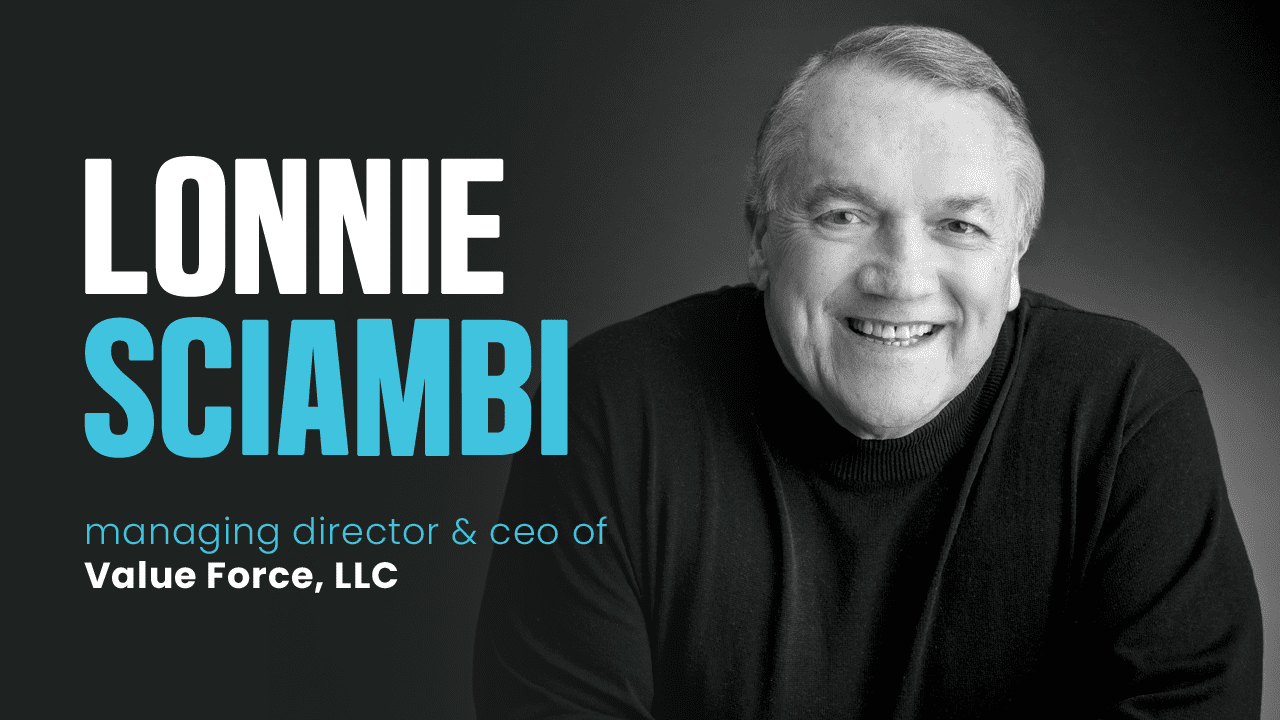Lonnie Sciambi is a man who has seen it all in the world of entrepreneurship. From starting and selling businesses to turning companies around and even going deeply into mergers and acquisitions, Lonnie has navigated the highs and lows of entrepreneurial life for more than three decades. His experiences have given him a unique perspective that he now shares with business owners looking for guidance. As someone who has walked the walk, his approach is refreshingly hands-on. “I don’t cross the threshold unless there’s a problem to be solved or a need to be addressed,” Lonnie says.
In this conversation with Lance Johnson, Lonnie shares insights into his career, the lessons learned from his many years in business, and what he believes are the key factors for any entrepreneur’s success.
The Beginnings of a Business Problem Solver
Lonnie’s journey didn’t start in the traditional way many business owners might expect. He started his career, “carrying a bag” (an old designation for a sales rep) for IBM. And he learned he was pretty good at it. Becoming one of the top sales people in the country for them. He never considered himself a marketer or a strategist, instead calling himself “an operating guy with a sales focus.” He developed a knack for diving deep into the dirt of businesses. “I can get down to the dirt quickly, help you solve the problem, and move on,” he says. It’s this hands-on approach that differentiates Lonnie from many other consultants, and it’s a style he’s been refining for more than 30 years.
Lonnie’s journey through entrepreneurship started with two successful exits, but those are just a part of the story. He’s invested in businesses, turned them around, and raised capital for them. But what sets Lonnie apart is the hard-earned wisdom of having seen entrepreneurship from every possible angle. “There’s no place I haven’t touched,” Lonnie says, referring to the wide range of industries and business types he’s worked with over the years.
The Shift from Early-Stage to Established Businesses
Lonnie’s current business, Value Force, is a refined version of his earlier consultancy, Small Business Force, which had a broader focus, working with early-stage businesses to more mature ones. With Value Force, Lonnie shifted his attention toward established small businesses. He explains, “Small Business Force was too broad. With Value Force, I really drill down into existing businesses, not startups.”
This transition allowed Lonnie to concentrate on his core strength: helping established businesses navigate their next stages of growth. “What I’ve found is that what gets a business to one level isn’t necessarily what’s going to get it to the next,” Lonnie says. This insight is fundamental to his work as he assists clients in scaling up while avoiding the pitfalls that might prevent them from reaching their next goal.
Entrepreneurship Requires Getting Your Hands Dirty
Lonnie’s no-nonsense, down-to-earth attitude about entrepreneurship is clear. Too many entrepreneurs, in his view, don’t understand the nitty-gritty of their businesses. “You’ve got to get inside the business,” Lonnie emphasizes. He often advises his clients not to stay in the clouds, but to dig into the details, truly understanding their markets and the problems they’re solving for their customers.
“When I work with entrepreneurs, I make sure they know what problem they’re solving, how they’re solving it, and what that means for their customers,” he adds. For Lonnie, it’s not just about high-level strategies but understanding the on-the-ground realities that influence whether a business will succeed or fail.
Three Keys to Entrepreneurial Success
When asked what he believes are the most critical things for an entrepreneur to master, Lonnie doesn’t hesitate: cash flow, understanding the problem you’re solving or the need you’re addressing, and identifying a market big enough for growth. “Cash is king,” Lonnie says. He believes many entrepreneurs, especially those coming from larger companies, mismanage their resources early on, not fully realizing that they now have to fill their own supply cabinets.
According to Lonnie, the most significant hurdle small businesses face is managing their cash flow. “Most early-stage entrepreneurs burn through their cash too fast because they don’t know how to manage it,” he says. Lonnie sees this as a crucial skill that separates those who fail from those who succeed.
The second key to success, according to Lonnie, is understanding the problem or need you’re addressing. “If you’re not filling a need or fixing a problem, you’re missing the game,” Lonnie explains. At the core of any successful business is a clear understanding of what its customers want or need, and Lonnie stresses the importance of nailing this down from the beginning.
Finally, Lonnie emphasizes the importance of focusing on a market big enough to sustain growth. Entrepreneurs often fail to realize that the market they’re in may not have enough demand to allow their business to scale. “They get to $3 million but can’t get to $5 million,” Lonnie says, referring to the typical plateau many businesses face. Understanding the nuances of different markets and sectors is critical, and Lonnie helps his clients identify where their next opportunities lie.
The Evolution of Culture and Business
One of the more philosophical aspects of Lonnie’s approach is his belief in the importance of company culture. For him, culture is not something you write on a boardroom wall but something that starts with the people at the top. “Culture starts with the owner,” Lonnie says.
He believes that the values the owner brings into the business permeate every aspect of the company, from how employees are treated to how customers are served.
One of the turning points in Lonnie’s career was his time working at IBM, where the company’s cultural mantra was “respect for the individual.” He recalls a moment when IBM’s then-CEO, Tom Watson, called him directly to ask permission to visit one of his accounts. “That was respect for the individual,” Lonnie says. It’s a lesson that stuck with him and one that he continues to champion in his work with other entrepreneurs.
Lonnie’s belief is that if a company focuses on its employees, the employees will focus on the customers, creating a ripple effect that leads to success. “If you want to be customer-centric, start by being employee-centric,” Lonnie advises. This approach to culture is one he continues to see as essential for the long-term success of any business.
The Future: Making Money While He Sleeps
Lonnie is in a unique position. With decades of experience under his belt, he’s not in the game for sheer survival anymore. He does it because he loves it. However, that doesn’t mean he isn’t setting goals. “My goal for the next year is to figure out how I can make more money while I sleep,” Lonnie says, with a laugh. He admits that it’s a goal many entrepreneurs have, but it’s one he’s actively pursues as he continues to refine his business model and explore new ways to create passive income.
Final Reflections
When asked what advice he’d give to his younger entrepreneurial self, Lonnie’s answer is straightforward: “Don’t invest in small businesses unless you’re ready to get lucky.” Luck, Lonnie says, plays an enormous role in success. He believes it’s a combination of talent, timing, and the ability to be in the right place at the right time that leads to entrepreneurial success.
In Lonnie Sciambi’s story, there are lessons for every entrepreneur. His experiences—both the triumphs and the mistakes—offer a rich well of knowledge for those looking to start, grow, or turn around a business. His focus on cash flow, understanding customer needs, and the importance of culture provides a clear blueprint for business success. And if there’s one thing that Lonnie would remind every entrepreneur, it’s this: “At the end of the day, it’s all about customers. Nothing else matters.”
Connect with Value Force on LinkedIn
Connect with Lonnie on LinkedIn


